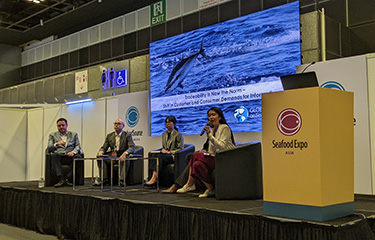Thai Union: Traceability key to success of seafood sustainability efforts

The Global Dialogue on Seafood Traceability (GDST), launched in February 2020, has already gained the support of some of the largest seafood companies in the world, and that trend is likely to continue as seafood companies focus on increased sustainability, according to Thai Union Group Sustainability Director Adam Brennan.
Brennan said traceability is the linchpin holding the entire sustainability movement together. Speaking during a conference panel at Seafood Expo Asia – held from 14 to 16 September 2022 at the Suntec Singapore Convention and Exhibition Centre – Brennan said the industry's other sustainability goals can’t be met if traceability isn’t universally accepted as a mandatory part of doing business.
Thai Union’s traceability goals include combating climate change, promoting a healthy diet through seafood consumption, ensuring sustainable sourcing, and protecting workers within its supply chain, Brennan said. Those goals will remain out of reach without traceability in the company’s supply chains, he said.
“Without traceability, these objectives are impossible,” Brennan said. “How can we protect workers in our supply chain if we don’t know what vessels [the seafood] is coming from?”
If a company doesn't have a traceability system in place, it's impossible for them to make claims of sustainability, Brennan said.
“Traceability is absolutely essential in conducting full assessment and due diligence of your supply chain,” Brennan said. “It is essential that we get more data from the supply chain.”
That determination, he said, is the result of an assessment of Thai Union’s supply chain that revealed key steps the company could take to ensure its supply-chain meets higher standards.
“When we started this year, we were not necessarily GDST-compliant,” Brennan said. “But what we recognized is we need to drive one common standard if we’re going to move forward on traceability.”
That assessment is why Thai Union has committed to being GDST-compliant and have full-chain traceability in its tuna supply chain by 2025, he said.
“I think traceability requires every actor along the supply chain to be on board. There’s a huge amount of education that’s still needed,” Brennan said.
The good news for companies like Thai Union is that traceability can be profitable, according to Hajime Tanaka, a research fellow with the Ocean Policy Research Institute. Tanaka performed extensive research on the Tokyo Bay Fish Passport that found customers gravitated to seafood with greater traceability bona fides.
The Tokyo Fish Passport consists of a QR code on seafood packaging, which links to information about when and where it was caught, the gear type it was caught with, how it was transported, and a profile of those involved in the catching of their food.
Tanaka found through his research that passport-supported seafood had a much higher likelihood of being purchased, especially amongst customers looking to buy a type of fish they had never tried before. In addition, repeat customers – people who tend to buy fish more often – were much more willing to purchase seafood with the Tokyo Fish Passport QR code present.
Through multiple trials and surveys, Tanaka found that the willingness to buy directly translated to real value. According to his research, the Tokyo Fish Passport was equivalent to a value of JPY 31 to JPY 35 (USD 0.21 to USD 0.24, EUR 0.22 to EUR 0.25) per sale.
“This traceability information can bring economic profits,” Tanaka said.
Further public education could enhance that profit margin, Tanaka said, as consumers were willing to pay more for traceability if they had a higher understanding of its significance.
“In some ways, it is true, people don’t realize the importance of things until they are shown,” he said. “The willingness to pay for this information totally depends on the literacy of the people. We have to tell the people why it is important.”
Brennan said Thai Union's work on improving the traceability of its seafood had led it to want even more information about its catch.
“At the beginning of our traceability [journey] … we didn’t really know what we wanted, and when we got information, we wanted more,” he said.
Brennan said to him, traceability is the “heart and soul” of sustainability.
“There’s a reason we place traceability at the [center] of our strategy,” he said. “Nothing is achievable without it.”
Photo by Chris Chase/SeafoodSource






Share